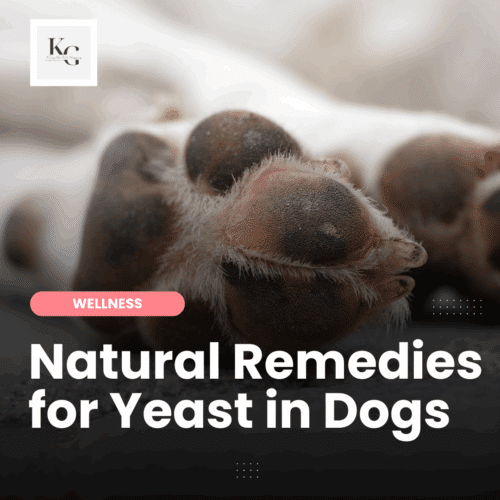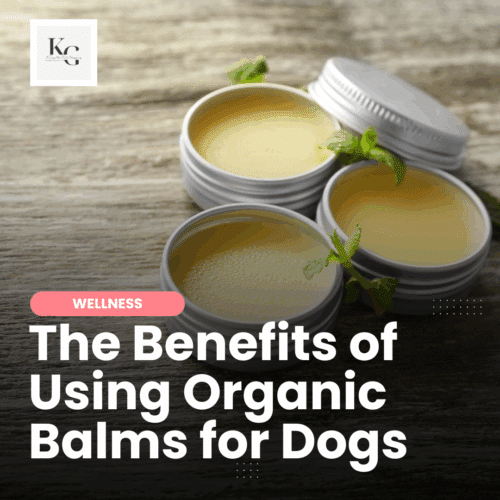Keep the Tail Wagging is supported by pet parents. I occasionally earn a commission (at no additional cost to you) when you click through an affiliate link to one of my favorite products. Thank you for your support. Read More
I use a supplement that has decaffeinated green tea as an ingredient. Occasionally, I'll hear from someone concerned about the toxic reputation of green tea and caffeine, arguing that even decaffeinated green tea has a small amount of caffeine. With the Internet telling us that green tea is toxic to dogs, why am I comfortable giving this supplement to my dogs? In this article, I will share what I've learned about green tea, and by the end, I hope to explain why I'm not concerned for my dogs.
What's Green Tea?
Green tea is a type of tea made from the leaves of the Camellia sinensis plant that have undergone minimal oxidation during processing. This distinguishes it from other types of tea, such as black tea or oolong tea, which are oxidized to varying degrees. Green tea is known for its rich history and numerous health benefits due to its high concentration of antioxidants and beneficial compounds.
The production of green tea involves harvesting the tea leaves and quickly heating or steaming them to prevent oxidation. This process helps retain the leaves' natural green color and preserves the antioxidants and other beneficial compounds present in the tea.
Green tea is commonly consumed as a hot or cold beverage and is enjoyed for its refreshing taste and various health benefits. Some key health benefits of green tea (for humans) include improved heart health, enhanced brain function, weight management support, and potential cancer-fighting properties.
Green tea is a popular beverage worldwide, available in various forms, including loose leaves, tea bags, and powdered matcha green tea.
Benefits of Decaffeinated Green Tea
Decaffeinated green tea offers several benefits similar to regular green tea, with the additional advantage of reduced caffeine content. Some key benefits include:
- Antioxidant Properties: Green tea, including decaffeinated versions, is rich in antioxidants like catechins, which help protect cells from damage and reduce inflammation.
- Improved Heart Health: Studies suggest that green tea consumption may help lower cholesterol levels, improve blood vessel function, and reduce the risk of heart disease.
- Weight Management: Green tea, including decaffeinated varieties, may support weight loss efforts by boosting metabolism and promoting fat oxidation.
- Brain Health: Some research indicates that green tea compounds can enhance brain function, improve mood, and potentially reduce the risk of neurodegenerative diseases.
- Cancer Prevention: The antioxidants in green tea have been linked to a reduced risk of certain types of cancer, though more research is needed in this area.
- Improved Dental Health: Green tea may help reduce bacteria in the mouth, leading to improved dental health and fresher breath.
- Reduced Caffeine Intake: Opting for decaffeinated green tea allows individuals to enjoy the health benefits of green tea without the stimulating effects of caffeine, making it a suitable choice for those sensitive to caffeine or looking to limit their intake.
These benefits make decaffeinated green tea a popular choice for individuals who want to enjoy the health advantages of green tea without the stimulating effects of caffeine.
The Elephant in the Room: Caffeine
One of the main reasons people are wary of green tea is the caffeine, often stating that decaffeinated green tea still contains some caffeine.
According to the U.S. Food and Drug Administration (FDA) and other health authorities, a moderate caffeine intake is typically defined as up to 400 milligrams per day for most healthy adult humans. Decaffeinated green tea has far less than the 400-milligram recommendation.
- Decaffeinated Green Tea:
- Decaffeinated green tea typically contains about 2-5 milligrams of caffeine per 8-ounce (240-milliliter) cup. The exact amount can vary depending on the manufacturer's decaffeination process.
- Regular Green Tea:
- Regular green tea contains around 15-30 milligrams of caffeine per 8-ounce (240-milliliter) cup. The caffeine content may be influenced by factors such as the type of green tea and brewing method.
- Earl Grey Tea:
- Earl Grey tea is a type of black tea flavored with bergamot oil. It typically contains 30-40 milligrams of caffeine per 8-ounce (240-milliliter) cup, but the actual caffeine content can vary depending on the brand and brewing method.
- Coffee:
- A typical 8-ounce (240-milliliter) cup of coffee contains about 80-100 milligrams of caffeine. However, this amount can vary widely depending on the type of coffee beans, brewing method, and serving size.
Is Caffeine Toxic to Dogs?
Giving caffeine to dogs can be dangerous and potentially life-threatening due to their inability to metabolize caffeine as effectively as humans. Here are some risks associated with giving caffeine to dogs:
- Toxicity: Dogs are much more sensitive to caffeine than humans. Caffeine is a stimulant that can cause toxicity in dogs, even at relatively low doses. Ingesting caffeine can lead to symptoms such as restlessness, rapid heart rate, tremors, vomiting, diarrhea, seizures, and even death.
- Central Nervous System Effects: Caffeine can affect a dog's central nervous system, leading to symptoms such as hyperactivity, agitation, and, in severe cases, seizures.
- Cardiovascular Effects: Caffeine can increase heart rate and blood pressure in dogs, which can be harmful, especially for dogs with pre-existing heart conditions.
- Gastrointestinal Issues: Ingesting caffeine can irritate a dog's gastrointestinal tract, leading to vomiting, diarrhea, and abdominal pain.
- Fatal Consequences: Ingesting high amounts of caffeine, such as from coffee grounds or caffeine pills, can result in caffeine toxicity and potentially be fatal for dogs.
Given these risks, why would I give my dogs a supplement containing decaffeinated green tea?
Green Tea and Gussy's Gut
I add Gussy's Gut to my dogs' diet several days a week to help build a diverse gut microbiome, provide additional nutrients, and support a healthy immune system.
Ingredients in Gussy's Gut Daily
The active ingredients are as follows, with decaffeinated green tea third from the bottom of the list.
*Cabbage, *Cauliflower, *Broccoli, *Cilantro, *Parsley, *Lacinato Kale, *Mustard Greens, *Jerusalem Artichoke (Sunchoke), *Dandelion, *Turmeric, *Papaya, *Red Beets, *Milk Thistle, *Oregano, *Wild Blueberries, *Alfalfa, *Decaffeinated Green Tea, Grass-fed Goat Kefir, *Ginger.
* = Organic and fermented.
How Much Caffeine is Lethal for Dogs?
According to Provet, a website that offers animal health advice and resources for veterinarians, caffeine is lethal to dogs at concentrations of 150 milligrams per kilogram or 2.2 pounds of weight. Therefore, based on the concentration provided, a lethal amount of caffeine for a 70 lb dog would be approximately 2,168.18 milligrams (or 2.17 grams). It's crucial to remember that this is a theoretical calculation, and actual sensitivity to caffeine can vary among individual dogs.
My research found that decaffeinated green tea typically contains about 2-5 milligrams of caffeine per 8-ounce (240-milliliter) cup, which is a fraction of the amount that is considered lethal, and significantly less than what is in a bag of Gussy's Gut.
Additionally, I don't follow the dosing recommendations on the bag. I add one teaspoon of Gussy's Gut to each of my dogs' meals several days a week, which is approximately 1/3 less than the dosing recommendation.
Does Caffeine Store in a Dog's System?
Another concern people have shared is that caffeine will build up in a dog's system over time.
I couldn't find a study that suggested this is the case for dogs. However, I was able to confirm that caffeine is not stored in a human's system. The majority of caffeine is metabolized in the liver and excreted through urine. Therefore, I'm not concerned about the impact on my dogs' health over time, although dogs are more sensitive to caffeine than humans, and a human's experience doesn't always equate to what a dog will experience.
Is Gussy's Gut a Good Fit for All Dogs?
Although I don't have an issue with the ingredients in Gussy's Gut, it doesn't mean this supplement is appropriate for all dogs. The fermented ingredients may be an issue for dogs with hypersensitivity to histamines, mast cell tumors, or yeast overgrowth. The original formulation contained cheese and kelp, which posed a problem with some dogs (the new formulation doesn't include these ingredients).
If someone believes the decaffeinated green tea in Gussy's Gut is a deal breaker, this isn't the right supplement for their dog.
Other Uses of Green Tea with Dogs
Green tea can have some beneficial topical uses for dogs due to its antioxidant and anti-inflammatory properties. Here are some ways green tea can be used topically for dogs:
- Anti-itch Spray: Green tea can be brewed and cooled to create a soothing anti-itch spray for dogs with skin irritations or allergies. The antioxidants in green tea can help reduce inflammation and itching on the skin.
- Ear Cleaning Solution: Green tea can be used as a gentle ear cleaning solution for dogs. Brewed green tea can be cooled and used to clean your dog's ears to help prevent infections and reduce inflammation.
- Paw Soaks: Soaking your dog's paws in green tea can help soothe irritated skin, reduce itching, and relieve allergies or hot spots. Green tea's anti-inflammatory properties can help calm redness and inflammation in the paws.
- Coat Conditioner: Using a green tea rinse as a coat conditioner can help promote your dog's healthy and shiny coat. Green tea can help nourish the skin and fur, providing antioxidant benefits that may support skin health.
- Wound Care: Green tea's antioxidant and antimicrobial properties make it a good option for cleaning minor wounds on your dog. You can brew green tea, let it cool, and use it to gently clean and disinfect minor cuts or abrasions on your dog's skin.
Before using green tea or any other natural remedy topically on your dog, it is essential to perform a patch test on a small area of your dog's skin to check for any allergic reactions before applying green tea more extensively.
Final Thoughts on Green Tea
Although I understand why people are concerned about the risk of adding decaffeinated green tea to their dog's diet, I don't share the concerns. Each dog owner must make the appropriate choice for their dogs. If someone doesn't want to take the risk with Gussy's Gut, then they shouldn't add the supplement to their dog's meals. I've been using Gussy's Gut for over a year at the time of this article and have seen nothing but positive benefits with my dogs, the most notable benefit being the healing of my dog's leaky gut.





